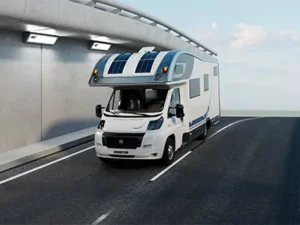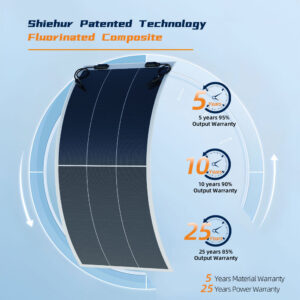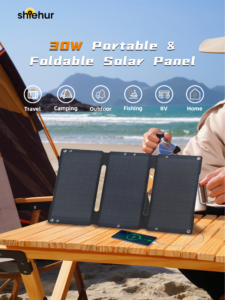What Does IP68 Waterproof Mean for Solar Panels?
When shopping for solar panels, you might come across the term “IP68 waterproof.” But what does this term actually mean, and why is it important for solar panels? In this blog post, we’ll break down what IP68 waterproofing is and why it matters when choosing solar panels, especially for outdoor or portable use.
Understanding IP Ratings
The “IP” in IP68 stands for “Ingress Protection,” a standard set by the International Electrotechnical Commission (IEC) to define the level of protection that an electrical device has against dust, dirt, and moisture. The IP rating is followed by two numbers: the first number indicates the level of protection against solid objects (like dust), and the second number indicates the level of protection against liquids (like water).
Breaking Down IP68
An IP68 rating is one of the highest levels of protection available. Here’s what each part of the rating means:
“6” (Dust Protection): The first digit, “6,” means the device is completely dust-tight. This is the highest level of protection against dust, meaning no dust particles can enter the device, no matter the conditions.
“8” (Water Protection): The second digit, “8,” indicates the device is protected against water ingress when submerged beyond 1 meter. The exact depth and duration can vary depending on the manufacturer, but generally, it means the device can be submerged in water for extended periods without being damaged.
Why IP68 Waterproofing Matters for Solar Panels
For solar panels, especially those used in outdoor, portable, or harsh environments, an IP68 rating is crucial. Here’s why:
Durability in All Weather Conditions: Solar panels with an IP68 rating are designed to withstand harsh weather conditions, including heavy rain, snow, and dust storms. Whether you’re installing panels on a rooftop, using them on an RV, or carrying them on a hiking trip, you can trust that they’ll continue to function optimally without damage from the elements.
Extended Lifespan: Solar panels are a long-term investment. An IP68 rating ensures that your panels are protected against environmental factors that could cause wear and tear over time. This protection helps extend the lifespan of your panels, ensuring you get the maximum return on your investment.
Reliable Performance: Dust and water can interfere with the efficiency of solar panels by blocking sunlight or damaging internal components. With IP68-rated solar panels, you don’t have to worry about these issues. They’re built to deliver reliable performance even in challenging conditions, ensuring consistent energy production.
Applications of IP68-Rated Solar Panels
IP68-rated solar panels are ideal for a variety of applications, including:
Residential Use: Homeowners can install IP68-rated panels on their roofs, confident that they’ll withstand rain, wind, and debris, maintaining high efficiency over the years.
Commercial and Industrial Use: Businesses looking for reliable, low-maintenance solar solutions can benefit from IP68-rated panels, which reduce the need for frequent cleaning and maintenance.
Portable and Off-Grid Use: For those who love outdoor adventures or live in remote locations, IP68-rated solar panels provide a dependable energy source. Whether you’re camping, boating, or living off the grid, these panels can handle the environment’s challenges and keep powering your devices.
Conclusion
When investing in solar panels, considering the IP rating is essential for ensuring durability, reliability, and longevity. An IP68 rating provides peace of mind, knowing your panels are protected against the elements, no matter where you use them. If you’re looking for solar panels that offer top-tier waterproofing and dust protection, consider our range of IP68-rated solar panels designed to meet your needs, whether for home, business, or adventure. Stay powered, stay protected with IP68 waterproof solar panels!







